So, are you considering kicking out your spouse in North Carolina? Well, let’s clarify this – there is no tricky loophole to remove them. You would require a court order, plain and simple, to legally force them out. If safety is a concern, a Domestic Violence Protective Order can be utilized. Without that official approval, both of you have a right to stay in the marital home. If situations escalate, law enforcement will intervene. It’s a complex legal process, so a family law attorney will serve as your guide through this difficult situation. Familiarize yourself with the details before taking any action.
Key Takeaways
- Court order required to evict spouse in NC.
- Domestic Violence Protective Order can legally remove spouse.
- Understanding DVPO requirements crucial for eviction.
- Violating a DVPO can lead to criminal charges.
- Seeking legal advice from a family law attorney recommended.
Domestic Violence Protective Order form North Carolina
As an affiliate, we earn on qualifying purchases.
As an affiliate, we earn on qualifying purchases.
Legal Rights of Spouses in NC
You can't unilaterally evict your spouse from the marital home in North Carolina without a court order. It's crucial to understand that both you and your spouse have equal rights to stay in the marital home unless a court intervenes.
This means that legally removing your spouse from the home requires a court order, such as a Domestic Violence Protective Order. In North Carolina, the legal system prioritizes safety and fairness in such matters, ensuring that no one is unjustly forced out of their home without due process.
If you find yourself in a situation where you feel the need to remove your spouse from the marital home, seeking guidance from a family law attorney is advisable. They can help you navigate the legal complexities involved and explore your options within the bounds of North Carolina's family law regulations.

North Carolina Law, Attorney Bar Graduate Lawyer College T-Shirt
Legal Education design. If you've graduated from college or University in North Carolina and are destined to be…
As an affiliate, we earn on qualifying purchases.
As an affiliate, we earn on qualifying purchases.
Domestic Violence Protective Orders
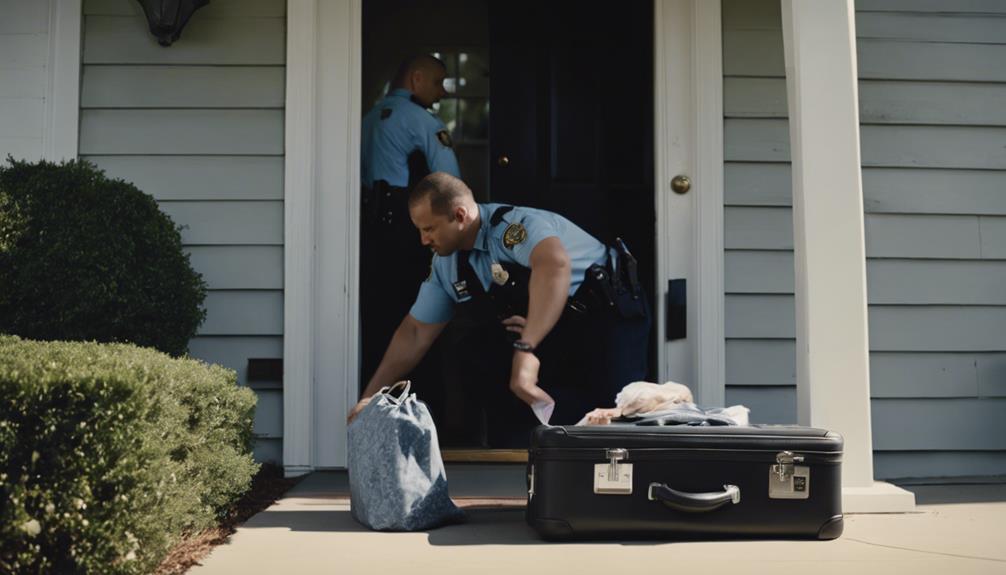
Let's talk about Domestic Violence Protective Orders (DVPOs) in North Carolina. These orders can legally kick out a spouse from the marital home if there's domestic violence involved.
If you're thinking of getting a DVPO, it's essential to understand the requirements and the serious legal consequences for violating these orders.
Stay tuned to learn more about how DVPOs can provide protection and what happens if they're not followed.
Protective Order Requirements
When seeking a Domestic Violence Protective Order (DVPO) in North Carolina, the requirements mandate a demonstration of domestic violence or a reasonable fear of imminent harm.
These orders offer legal protection by instructing the abusive spouse to stay away from you and refrain from contacting you. The DVPO can also address important matters such as temporary custody, support, and who gets to stay in the home.
It's important to understand that violating a DVPO can lead to serious consequences, including criminal charges and penalties. So, it's vital to take these orders seriously and follow the guidelines set forth.
If you find yourself in a situation where you need a DVPO, it's wise to seek the guidance of a family law attorney. They can help you navigate the process and ensure you fully comprehend the implications of seeking a DVPO in North Carolina.
Your safety and well-being are paramount, and these orders are designed to provide you with the necessary protection.
Legal Consequences for Violations
Violating a Domestic Violence Protective Order (DVPO) in North Carolina can lead to severe legal repercussions, including criminal charges. Remember, a DVPO is a serious legal document meant to protect those experiencing domestic violence.
Here are some consequences you could face for breaking a DVPO:
- Criminal Charges: You might end up facing criminal charges for violating the DVPO. These charges can have long-lasting effects on your record and future opportunities.
- Fines and Jail Time: Breaking a DVPO can result in hefty fines and even time behind bars. It's important to take these orders seriously to avoid these penalties.
- Contempt of Court: Violating a DVPO can also lead to contempt of court charges. This can further complicate your legal situation and result in additional consequences.
Seeking legal advice is essential to understand the full implications of not following a DVPO in North Carolina.
eviction legal aid North Carolina
As an affiliate, we earn on qualifying purchases.
As an affiliate, we earn on qualifying purchases.
Court Involvement in Eviction Process
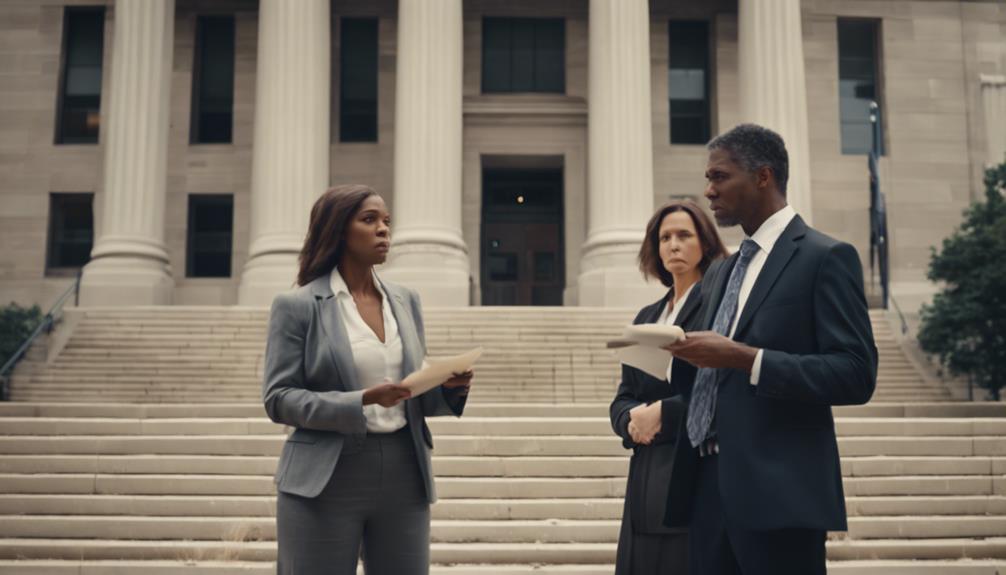
To legally remove your spouse from the marital home in North Carolina, court involvement through a Domestic Violence Protective Order (DVPO) is necessary. Without this court order, both you and your spouse have the right to stay in the marital home. Law enforcement can only step in if there's a potential danger to one of you. So, if you find yourself in a situation where you need to evict your spouse, seeking help from a family law attorney is key. They can guide you through the process and help you understand your options under the law.
Let's break down the key players involved in the eviction process:
| Key Players | Role |
|---|---|
| Court Order | Needed to legally remove your spouse |
| Marital Home | Where the eviction process takes place |
| Spouse | The individual being evicted |
| DVPO | Court-issued document for eviction |
| Law Enforcement | Intervenes if harm is imminent |

She’s Birdie 3.0 New Version – The Original Personal Safety Alarm for Women by Women–Loud Siren, Flash Light and Rechargeable Battery in a Variety of Colors (Lavender Purple)
NEW AND IMPROVED – When faced with danger, activate Birdie’s piercing 130dB siren and high-intensity flashing strobe light…
As an affiliate, we earn on qualifying purchases.
As an affiliate, we earn on qualifying purchases.
Threat of Harm Scenarios
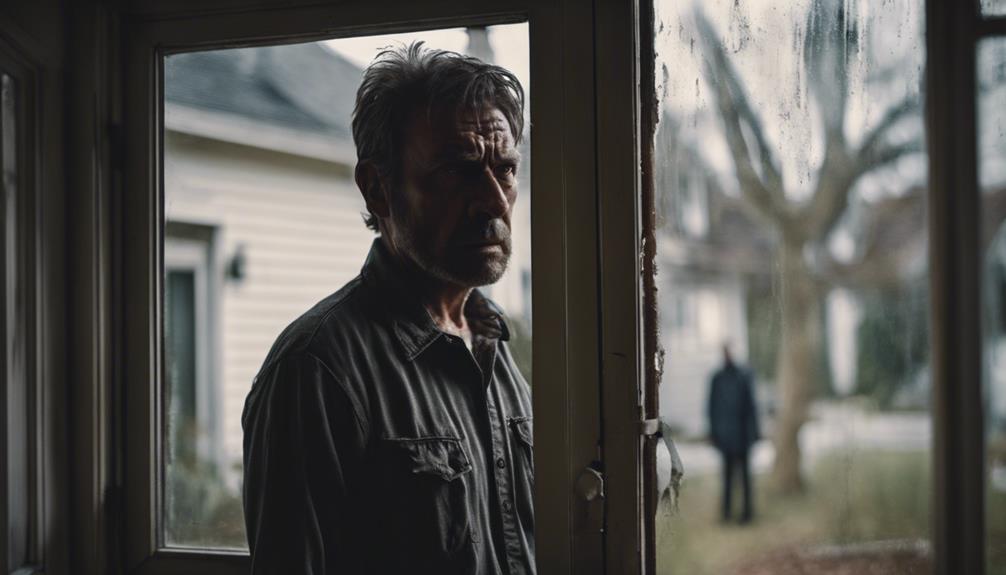
When it comes to kicking out your spouse in North Carolina due to threats of harm, your immediate safety is the top priority. Knowing the legal options available to you is essential in these situations.
Immediate Safety Concerns
How can threats of harm or violence influence the decision to seek a Domestic Violence Protective Order (DVPO) in North Carolina?
When immediate safety concerns arise, taking action to protect yourself or your loved ones becomes a top priority.
Here are three ways threats of harm can impact your decision-making process:
- Seeking a DVPO: Threats of harm can be a clear indicator that a DVPO is necessary to guarantee your safety and well-being.
- Legally Removing Your Spouse: In cases where harm is imminent, legally removing your spouse from the marital home may be vital to prevent any potential violence.
- Involving Law Enforcement: If you feel unsafe due to threats of harm, involving law enforcement can provide immediate intervention and protection for both parties.
Legal Options Available
When facing threats of harm, understanding the legal options available becomes imperative for ensuring your safety and well-being in North Carolina. In threat of harm scenarios, legal assistance can be your guiding light. One crucial avenue to explore is obtaining a Domestic Violence Protective Order, a powerful tool that legally mandates the removal of a threatening spouse from the marital home. Without this court order, both partners typically have equal rights to stay unless there is a clear risk of harm. Reporting threats to the police is crucial, and seeking legal counsel can help you navigate the process of obtaining restraining orders for your safety. By utilizing these legal options, you can take proactive steps to safeguard your spousal safety and well-being.
| Legal Options | Description |
|---|---|
| Domestic Violence Protective Order | Court order to remove threatening spouse from home |
| Court Order | Necessary for legal removal in threat of harm cases |
| Spousal Safety | Ensuring well-being and safety in marital disputes |
| Legal Assistance | Guidance in obtaining restraining orders for safety |
| Threat of Harm | Reporting to police and seeking legal counsel |
Law Enforcement Intervention
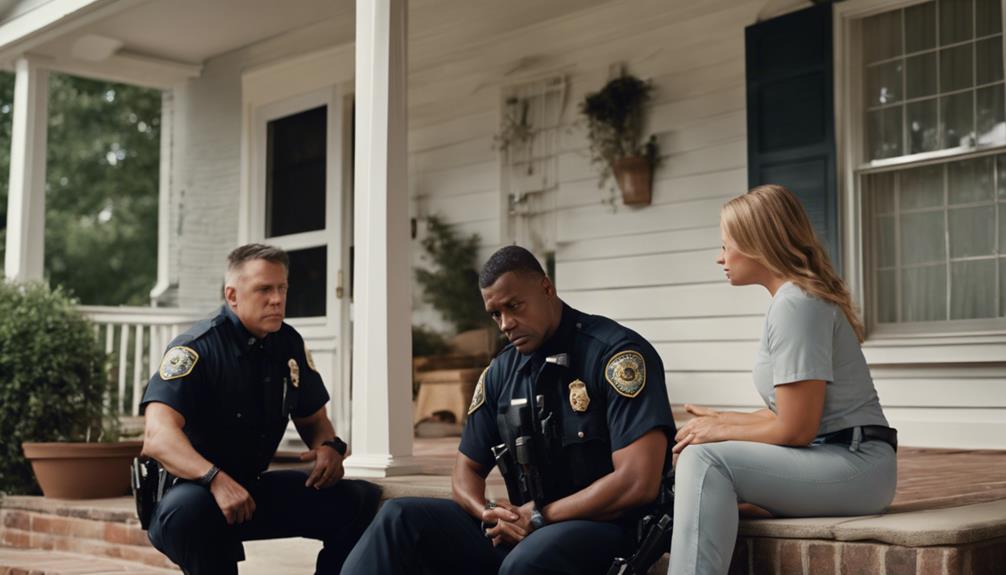
Law enforcement may step in to address potential harm or danger during a marital dispute in North Carolina. When things get heated, and safety becomes a concern, here's how law enforcement can help:
- Risk Assessment: Law enforcement is trained to assess the level of risk involved in a marital dispute, ensuring that safety is the top priority.
- Intervention Protocols: If there's a genuine risk of harm, law enforcement can intervene to protect individuals involved in the dispute, maintaining a safe environment.
- Legal Authority: In cases where there's clear danger, law enforcement has the authority to remove the spouse causing harm, ensuring the safety of all parties.
Navigating Marital Home Disputes
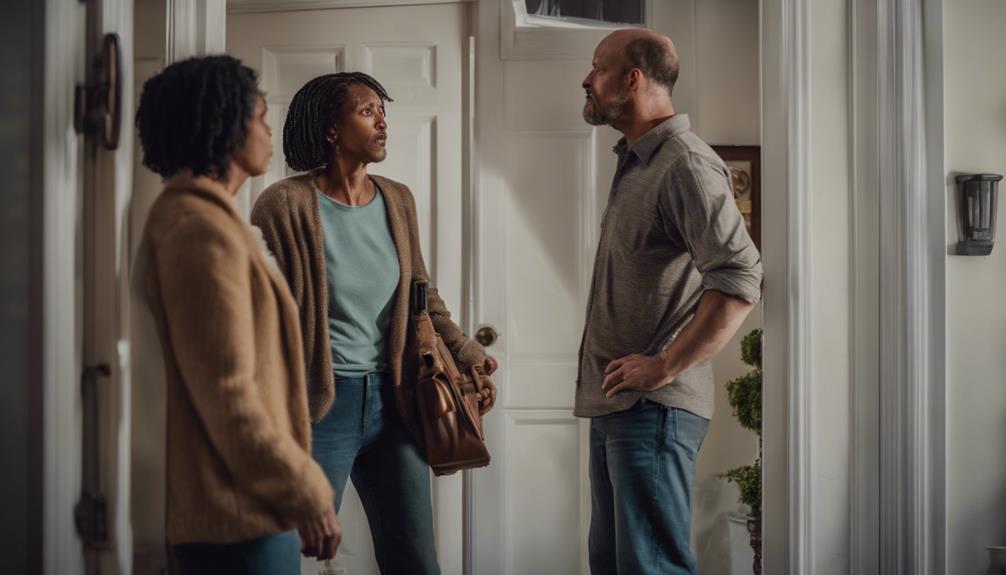
Dealing with marital home disputes in North Carolina requires understanding the legal procedures involved and seeking guidance from a family law attorney to protect your rights.
When it comes to who gets to stay in the marital home during a separation or divorce, it's not as vital as changing the locks. You and your spouse both have equal rights to live there unless there's a safety concern. In cases of potential harm, a Domestic Violence Protective Order (DVPO) may be necessary to remove your spouse from the shared residence. If things escalate, law enforcement intervention might be needed to guarantee everyone's safety.
To navigate these tricky waters, it's important to consult with a divorce attorney who can provide you with the legal advice you need. By understanding your rights and getting proper guidance, you can protect your interests in any disputes over the marital home. Additionally, a divorce attorney can help you address important issues such as property division and custody arrangements while ensuring compliance with local laws. If your case involves international elements, they can also guide you through complex matters like foreign divorce recognition in Philippines, which often requires specific legal procedures to be validated. Having experienced legal counsel ensures you are well-prepared to handle any challenges that may arise during the divorce process.
Family Law Attorney Guidance

Seeking advice from a knowledgeable attorney is essential for successfully managing the complexities of removing a spouse from the marital home in North Carolina. When dealing with such a sensitive matter, a family law attorney can be your guiding light through the legal maze.
Here's why you need their help:
- Legal Procedures: A family law attorney will outline the correct legal procedures for eviction and make sure you're following the law every step of the way.
- Court Orders: They can assist in obtaining necessary court orders to enforce the eviction of your spouse from the marital home.
- Divorce Laws: Navigating the intricate web of divorce laws can be challenging, but a family law attorney will help you understand your rights and obligations under the law.
With their expertise, you can make informed decisions and take the necessary steps to protect yourself during this challenging time.
Don't hesitate to seek out legal advice to ensure a smoother process for removing your spouse from the home.
Complexities of Legal Removal
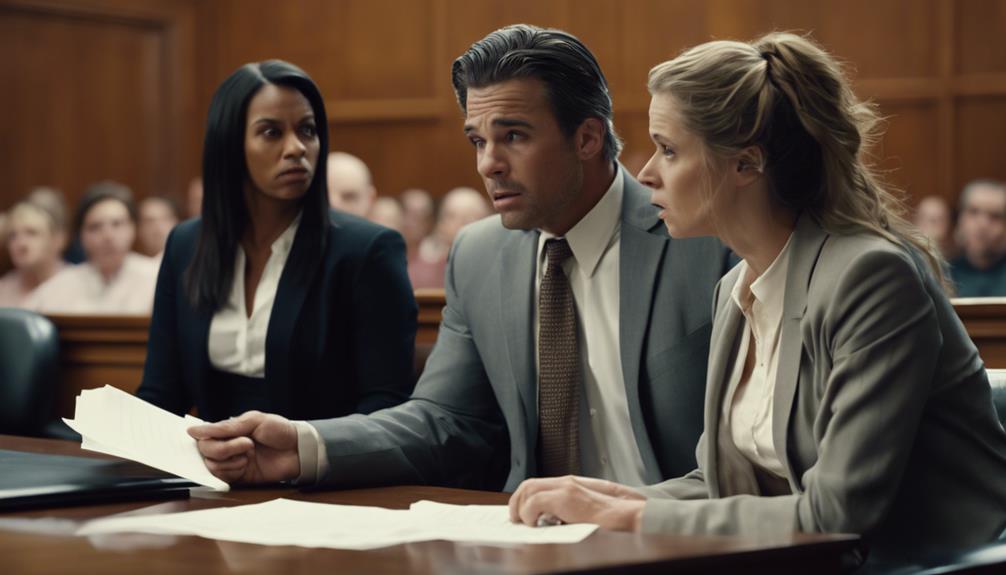
Embarking on the process of legally removing your spouse from the marital home in North Carolina can present various complexities that require careful consideration and expert guidance. You can't just show them the door and change the locks – it doesn't work that way.
Without a court order, like a Domestic Violence Protective Order, both of you have an equal right to stay in the marital home. If you take impulsive action and try to kick them out on your own, you might end up facing some serious legal repercussions. It's like trying to navigate a maze without knowing the way – you're bound to make a wrong move.
That's where a family law attorney swoops in to save the day. Consulting with them is key to understanding your legal options for removing your spouse from the marital home. They're like the expert guide leading you through a labyrinth of legal jargon and complicated procedures, all while ensuring your rights and interests are protected.
Importance of Seeking Legal Advice

Legal advice is essential to fully grasp the implications of removing your spouse from the marital home in North Carolina. When it comes to dealing with marital property, residency rights, and legal procedures, seeking guidance from a family law attorney is key. Here's why you should consider getting professional help:
- Understanding Legal Procedures: A family law attorney can guide you through the necessary steps to make sure you're following the correct legal procedures when considering removing a spouse from the marital home.
- Protecting Marital Property: Legal advice can help you safeguard your rights when it comes to marital property division, ensuring that you aren't at a disadvantage during the process.
- Preserving Residency Rights: By consulting with a family law attorney, you can better understand your residency rights and make informed decisions regarding your living arrangements during this challenging time.
Frequently Asked Questions
How Can I Get My Husband Out of the House if He Refuses to Leave Nc?
If your husband refuses to leave in NC, you can't just give him the boot solo. You'll need a court order like a Domestic Violence Protective Order (DVPO) to legally kick him out.
Until then, both of you have the right to stay put unless there's a safety concern. For help maneuvering this sticky situation, it's wise to chat with a family law pro who can guide you through the legal options.
Can My Husband Cut Me off Financially?
So, can your husband cut you off financially? Well, it's like trying to make a sandwich without bread – it just doesn't work!
In North Carolina, there are legal repercussions for unilaterally cutting off financial support. Remember, spousal support obligations can extend beyond separation or divorce.
If you find yourself in this situation, it's important to consult a family law attorney to know your rights and explore your options for financial support.
What to Do When Your Spouse Cuts You Off?
When your spouse cuts you off, it's tough, but there are steps you can take. First off, talk to a family law attorney for solid advice.
Remember, in NC, you can't just kick out your spouse without a court order. If things get dicey, consider a Domestic Violence Protective Order for safety. Both of you have rights to the home unless a judge steps in.
Take care of yourself emotionally and financially during this challenging time.
What Is Spousal Abandonment in Nc?
So, you're wondering about spousal abandonment in NC.
It's when one partner up and leaves the marital home without a good reason or your say-so.
This can mess with divorce stuff like support and who gets what.
If your spouse ghosts you without any good excuse, it may cause legal drama down the line.
Stay sharp and know your rights if this situation hits close to home.
Conclusion
So, next time you're thinking about kicking out your spouse in NC, remember that there are legal rights to take into account!
Did you know that in North Carolina, over 20% of domestic violence protective orders involve situations where a spouse is trying to evict their partner from the marital home?
It's always best to seek legal advice and navigate the complexities of the law to guarantee a fair and just outcome for both parties.
Stay informed and stay safe!








